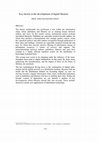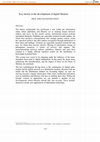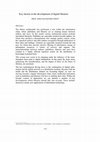Papers by John Mackenzie Owen

The library traditionally has performed a role within the information chain, where publishers and... more The library traditionally has performed a role within the information chain, where publishers and libraries act as clearing houses between authors and users. In this model various institutional parties perform specialized functions. Publishers are especially oriented towards authors, for whom they perform a dissemination role, manage quality control, create the 'canonical archive' and offer authors recognition through publication of their ideas and findings. Libraries are especially oriented towards the end user, for whom they provide selective filtering of information, storage of information resources, a variety of services and support. The interrelationships between authors, publishers, libraries and users have resulted in a highly efficient logistical system for the distribution of knowledge in printed form. This system now seems to be changing under the influence of the transformation from print to digital information. In this paper the main issues underlying this transformation, and the impact of these on the future of libraries, are examined.
Kennismanagement is een aanpak die de rol van kennis in en voor de organisatie centraal stelt, en... more Kennismanagement is een aanpak die de rol van kennis in en voor de organisatie centraal stelt, en zich ten doel stelt om kenniswerk aan te sturen en te ondersteunen om daarmee de meerwaarde van kennis optimaal te benutten. Kennismanagement heeft als uitgangspunt dat kennis en kenniswerk kan worden geïdentificeerd en in kaart gebracht, dat er procedures voor het genereren, beheren en toepassen van kennis kunnen worden ontwikkeld, en dat kennis daartoe kan worden vastgelegd in informatiesystemen. De moderne informatie- en communicatietechnologie biedt nieuwe mogelijkheden om kennis in organisaties te beheren en toegankelijk te maken
The value of grey literature (GL) has often been regarded as secondary to that of officially publ... more The value of grey literature (GL) has often been regarded as secondary to that of officially published documents. But digital information networks provide an opportunity for GL to become the most important type of electronic publication. The concept of `GL' itself will disappear as it evolves into a new concept of networked organizational publishing. This development will greatly increase the value of GL and lead to qualitative and quantitative changes in its use. This paper discusses the underlying developments, the necessary steps in moving from GL to networked publishing, and the expected benefits in terms of added value and usability.

Περιέχει το πλήρες κείμενοThe library traditionally has performed a role within the information c... more Περιέχει το πλήρες κείμενοThe library traditionally has performed a role within the information chain, where publishers and libraries act as clearing houses between authors and users. In this model various institutional parties perform specialized functions. Publishers are especially oriented towards authors, for whom they perform a dissemination role, manage quality control, create the 'canonical archive' and offer authors recognition through publication of their ideas and findings. Libraries are especially oriented towards the end user, for whom they provide selective filtering of information, storage of information resources, a variety of services and support. The interrelationships between authors, publishers, libraries and users have resulted in a highly efficient logistical system for the distribution of knowledge in printed form. This system now seems to be changing under the influence of the transformation from print to digital information. In this paper the mai...
Cultural Heritage in a Changing World, 2016
Libraries belong to the so-called ‘memory organisations’, together with archives and museums. Thi... more Libraries belong to the so-called ‘memory organisations’, together with archives and museums. This reflects the fact that the global library system acts as the collective memory of the world’s cultural and scientific heritage as recorded in the printed word. In the world of printed publications only libraries perform a memory function which guarantees to a certain extent that publications are not lost after immediate use. Digital deposit libraries could interconnect to form a comprehensive archival backbone for other libraries to provide service to users. In this way, there is no need for these other libraries to maintain their own digital collections (other than very frequently used current materials). Although the cost of digital archiving is higher than that of print archiving, this system would create enormous savings as compared to the current system.
Educ. Inf., 2003
This paper addresses the development of the department of Information Studies at the Universiteit... more This paper addresses the development of the department of Information Studies at the Universiteit van Amsterdam over the years and especially the impact of the Bologna Agreement on the content and educational form of the curriculum. It includes both outlines of the programmes as well as reflection on the educational methods. The accreditation procedures are also described. The paper ends with a reflection on the outcomes of the aims of the Bologna agreement. The text is an extension and elaboration of the paper presented at the EUCLID conference ‘Restructuring and adapting to European standards: overcoming regional variations in needs and interests in education for LIS’. 16–18 October 2002. Thessaloniki, Greece.
Palabra Clave [La Plata], 2011
It is the responsibility of the museum library to enhance the understanding of the museum collect... more It is the responsibility of the museum library to enhance the understanding of the museum collection and the role of museum objects as cultural documents. For many reasons, this role is only partially fulfilled, if at all. This is because in practice the library and its museum are insufficiently integrated to perform effectively together. We argue that in a digital world, the library and the museum can and should be re-integrated into a single cultural information system. However, since in practice digitization of the library and the museum follow different paths, museums and their libraries will have to change their thinking about how to proceed.
An important characteristic of most computer supported work environments is the distribution of w... more An important characteristic of most computer supported work environments is the distribution of work over individuals or teams in different locations. This leads to what we nowadays call `virtual' environments. In these environments communication between actors is to a large degree mediated, i.e. established through communications media (telephone, fax, computer networks) rather in a face-to-face way. Unfortunately, mediated communication limits the effectiveness of knowledge exchange in virtual environments because the communications media employed are less suited for tacit knowledge than for explicit, codified knowledge.

The library traditionally has performed a role within the information chain, where publishers and... more The library traditionally has performed a role within the information chain, where publishers and libraries act as clearing houses between authors and users. In this model various institutional parties perform specialized functions. Publishers are especially oriented towards authors, for whom they perform, in the case of science, a dissemination role, manage quality control, produce the ‘canonical archive’ (i.e. the global archive of scientific knowledge) and offer authors recognition through publication of their ideas and findings (Rowland 1997). Libraries are especially oriented towards the end user, for whom they provide selective filtering of information, storage of information resources, a variety of services (such as cataloguing and indexing, document delivery etc.) and support. The interrelationships between authors, publishers, libraries and users (including other parties as well, such as bookshops and subscription agents) have resulted in a highly efficient logistical syste...
The word library has lost its much of appeal during the final decades of the 20th century to the ... more The word library has lost its much of appeal during the final decades of the 20th century to the extent that even librarians often prefer to describe themselves as information (or even knowledge) managers. It therefore comes somewhat as a surprise that the word library has become extremely fashionable again.
Informatie is een artefact, iets dat door mensen wordt geconstrueerd. Daarom hebben wij mensen oo... more Informatie is een artefact, iets dat door mensen wordt geconstrueerd. Daarom hebben wij mensen ook de macht om over informatie te beschikken, het al of niet te maken, en het te bewaren of weg te gooien. Informatie gaat altijd ergens over, het bestaat niet uit betekenisloze signalen, maar uit symbolen waaraan we betekenis geven. Die betekenis ontstaat in de context van onze kennis en ervaringen, van onze persoonlijkheid en onze voorgeschiedenis. Daarom heeft informatie per definitie iets met onszelf te maken, het vormt een selectieve verbinding tussen onszelf en de werkelijkheid om ons heen.
n de titel van deze bijdrage staan twee begrippen diein het kader van bibliotheken nog niet zo ge... more n de titel van deze bijdrage staan twee begrippen diein het kader van bibliotheken nog niet zo gebruikelijkzijn: licenties en archieven. Onder licenties verstaan wein dit verband alle overeenkomsten tussen uitgevers enbibliotheken waarbij de uitgever aan de bibliotheek hetrecht verleent om, onder in de licentie bepaalde voor-waarden, gebruik te maken van een informatieproductof -dienst (kortweg: een publicatie). Kenmerkend voorzo’n licentie is dus dat de bibliotheek de publicatie nietin eigendom verkrijgt, en daardoor minder vrij is om ereen dienstverlening mee op te bouwen dan wanneer depublicatie wel in eigendom wordt verkregen. Een licen-tie kan de duur van het gebruiksrecht expliciet beper-ken, maar ook impliciet: het gebruiksrecht bestaat nogzolang als de licentiehouder aan alle licentievoorwaarden(bijvoorbeeld periodieke betaling) voldoet.
Een nieuwe visie op informatiewetenschap Een nieuw en krachtig impuls, noemt John Mackenzie Owen ... more Een nieuwe visie op informatiewetenschap Een nieuw en krachtig impuls, noemt John Mackenzie Owen de mogelijkheid om door de herstructurering van het wetenschappelijk onderwijs in Nederland te komen tot top-opleidingen op het vakgebied van de informatieprofessional. Hieronder schetst hij het door de 'BaMa-operatie' gecreëerde perspectief voor de opleiding informatiewetenschap aan de Universiteit van Amsterdam, de enige volledige universitaire opleiding op ons vakgebied. Tevens licht hij in kort bestek de ontwikkelingen bij verwante opleidingen toe.
In this paper I shall focus on the distinction between ‘grey’ and ‘white’ literature as a differe... more In this paper I shall focus on the distinction between ‘grey’ and ‘white’ literature as a difference in distribution modes. I shall argue that both publisher strategies and developments in the area of digitalisation and networking will result in an increasingly marginal role for the publishing industry and in a future information environment in which ‘grey’ will be the predominant distribution mode,
The dominant factor in the development of libraries is the ongoing move towards digital distribut... more The dominant factor in the development of libraries is the ongoing move towards digital distribution of information through the global network infrastructure. This implies a shift from the traditional role of the library as a 'clearing house' and service centre for printed publications, towards a role as a supplier of networked services for digital information resources.
Digital libraries are developed by traditional libraries. This simple statement entails a whole n... more Digital libraries are developed by traditional libraries. This simple statement entails a whole number of problems. The development of the digital library is in the majority of cases a transitional process, gradually transforming the traditional library into a networked digital service. All libraries involved in innovation towards the digital library are confronted with the problem how to continue running the existing library while introducing new technology, developing new services, and having to invest in innovation out of existing limited budgets. This truly is a challenge to library management. In this paper we shall explore a number of issues involved in justifying new developments and in obtaining and allocating the necessary funds.
VERANDERINGEN IN EEN vakgebied worden vaak zicht-baar in de aanduidingen die beroepsbeoefenaren v... more VERANDERINGEN IN EEN vakgebied worden vaak zicht-baar in de aanduidingen die beroepsbeoefenaren voor zichzelf kiezen. Het tijdschrift waarin dit artikel verschijnt, was tot twee jaar geleden nog een vaktijdschrift voor bibli-othecarissen, literatuuronderzoekers en documentalisten. Nu ...

Uploads
Papers by John Mackenzie Owen